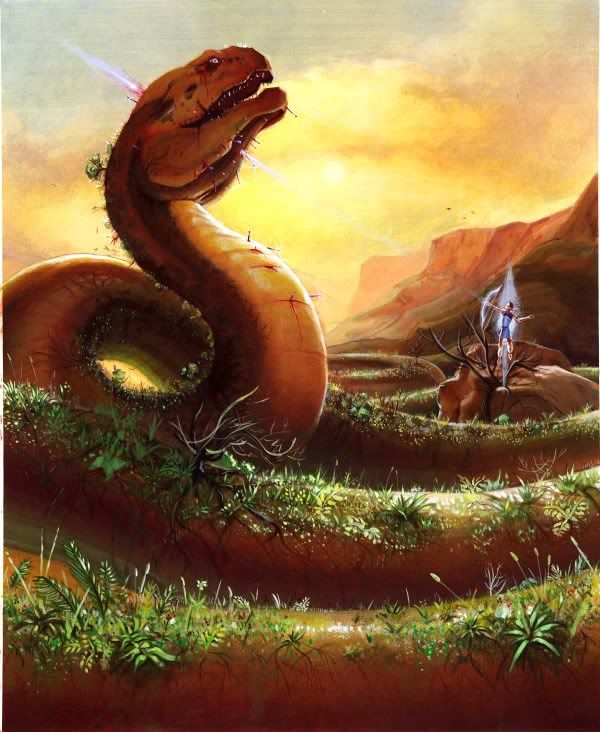I descend from the
mountain, taking in my surroundings. A
cool wind hits my face, and I know I have nearly reached the magical springs of
Delphi. The sky is pale blue, and not a
cloud in sight. As I walk, my skin is
warmed by the rising sun. Grass, still
wet with morning dew, cools my blistered feet.
I have been searching for three days for the beast.
I
reflect bitterly on the situation—Hera, out of nothing more than jealousy,
makes mother’s life unbearable. Zeus
didn’t even try and stop her from banishing Leto. How was she supposed to settle and give birth
if everyone was too afraid of punishment to let her into their homes? And after that didn’t work, she sends Python
to do her dirty work? Hera has left me no other choice. In order to live peacefully, the monster must
die.
Now,
on the fourth day of my hunt, I enter a shaded clearing with a sparkling stream
cutting through the middle. Kneeling
down, I drink handful after handful of the icy water. Overcome with exhaustion, I lay down next to
the stream, and it seems that the minute I shut my eyes, a terrifying roar
sounds from the east. Immediately I am
running out of the clearing and toward the noise.
My
feet splash in water, oddly warm compared to the stream water I had been drinking. I look up and stare in awe at the
magnificently ostentatious shrines. I
have reached Delphi. I walk around,
admiring the crystal clear waters of the springs, sparkling in an unnatural yet
beautiful way. The beauty is short-lived
as a scaly green dragon crashes into the area.
Without hesitation, the beast called Python snaps at me, inches away
from my head.
Jump
left, left again, now back, dodge right, roll forward, avoid his massive jaw at
all costs. I was doing fine defending
his attempts at murder, but I was
hunting him. It was my turn to do some damage. The next time Python came after me, I let him
hit me. With gleaming silver arrow in
hand, I lunged forward while Python’s open mouth was coming toward me. My arrow missed his brain but managed to
leave a gushing wound under Python’s eye.
With an ear-splitting shriek, Python whipped back and forth in
pain. This was my chance; using the same
arrow, I lifted my bow, and—
Well,
obviously I killed him. How could I
miss? I can’t. The only problem was that afterward Zeus got
in my face about how I committed a crime, and killing was forbidden amongst gods
of Olympus. Who needs that noise? I just played a little song on my lyre and
Zeus calmed down. Still, Gaea, the
mother of Python, was furious. To calm her down, I built a brilliant shrine to
Python in Delphi, right above his rotting corpse. Every four years, the Pythian Games are held
in my honor. And mother is safe, which
is good, because that’s kind of what this whole deal was about.





